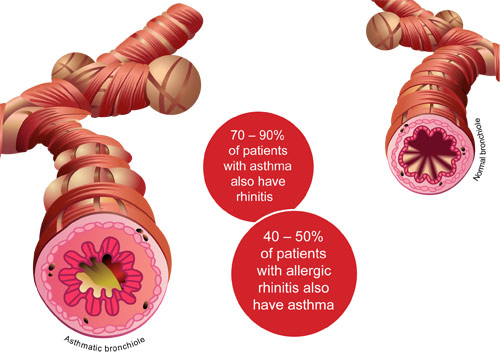Has your child been sneezing repeatedly, and complaining about a runny or stuffy nose? Is it accompanied by itchy and teary eyes?
Watch out, because these symptoms could signal a condition that is more than just a common cold. It could be rhinitis, which is a condition whereby there is inflammation of the mucous membranes in the nose, eyes, Eustachian tubes, middle ear, sinuses, and pharynx.
Allergic rhinitis is recognised as a global health problem, and it has the potential to cause significant debility. Over the past 50 years, it has been shown that allergic rhinitis and allergic asthma often co-exist. Many children with the kind of asthma that is easily triggered by allergens are also prone to having rhinitis.
When these two conditions are present in the same individual, he or she is likely to suffer more severe asthma attacks and might need stronger medications to control their asthma.
One airway, one disease
Asthma is a risk factor for getting rhinitis. But asthma is also more commonly found in patients with rhinitis.
A study that was conducted among 366 patients at four major hospitals around Malaysia found that 92% of patients with nasal symptoms also had allergic rhinitis. This goes to show that allergic rhinitis is common in people suffering from respiratory problems. It is a complex condition that can cause symptoms and affect many different organs involved in the respiratory system.
So, if you have a child with asthma, pay close attention to how your child is feeling, and how the condition fluctuates, develops or if new symptoms appear from time to time.
Early diagnosis of an additional condition such as rhinitis can give you and your child a headstart in taking steps to manage and cope with it. If proper treatment and management is administered, it is more likely that your child will suffer less of the debilitating effects that might affect their home, school and social life.
Control allergic rhinitis to control asthma
Controlling allergic rhinitis can help a person with asthma manage his symptoms. Allergic rhinitis can be classified as intermittent when the symptoms occur for less than four days in a week or lasts for less than four weeks, and persistent if the symptoms occur for more than four days a week and lasts for more than four weeks. Some of the steps you can take include:
Medications/Treatments
Generally, medications for rhinitis work by either blocking allergic responses or by reducing the severity of inflammation.
- Antihistamines are the most frequently prescribed medication for treating allergies. It is the first line of treatment for mild allergic rhinitis, and is effective to treat sneezing, nasal itchiness and runny nose.
- Oral antihistamines can reduce itching and redness in the eyes.
- A doctor may prescribe decongestants to help relieve allergy symptoms.
- Children with persistent allergic rhinitis will require nasal corticosteroids. It is a potent anti-inflammatory agent. It is effective in treating all nasal symptoms which include nasal obstruction, and is safe to use in children.
Allergen avoidance
Learning how to avoid potential triggers that may set off a child’s condition is key.
- Vacuum your home often to reduce dust mites.
- Provide adequate ventilation to reduce humidity.
- Remove carpets, pets and stuffed toys from the bedroom.
- If you have a garden, consider planting low allergen plants.
- Keep windows closed at home and while riding in a car.
- Advise your child to stay indoors early in the morning, during windy days and after thunderstorms, as these are times when environmental allergens are usually at peak numbers.
- If you have furry pets, try to keep them outside the home or wash them regularly.
- Eradicate cockroaches using appropriate gel-type, non-volatile insecticides.
- Encourage your child to shower right after they arrive home and clean their eyes with a wet cloth.
Be mindful to observe and identify the specific allergens that tend to trigger asthmatic or rhinitis symptoms in your child and to come up with ways to avoid them. Rhinitis is a long-term condition, but by using good control measures to manage the condition, it would increase the chances of your child being able to live a normal, active and productive life, without too much respiratory health problems.






Comments